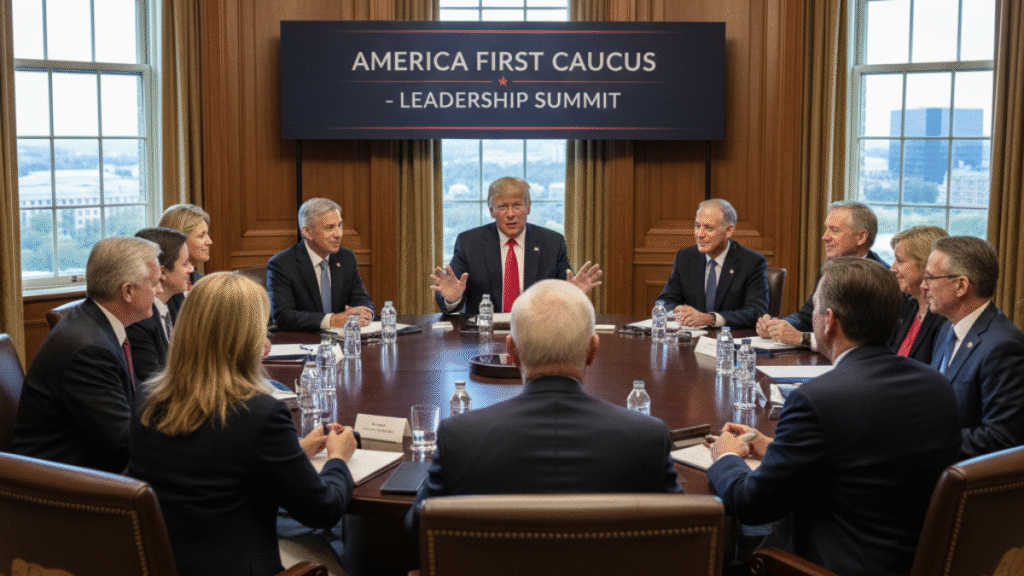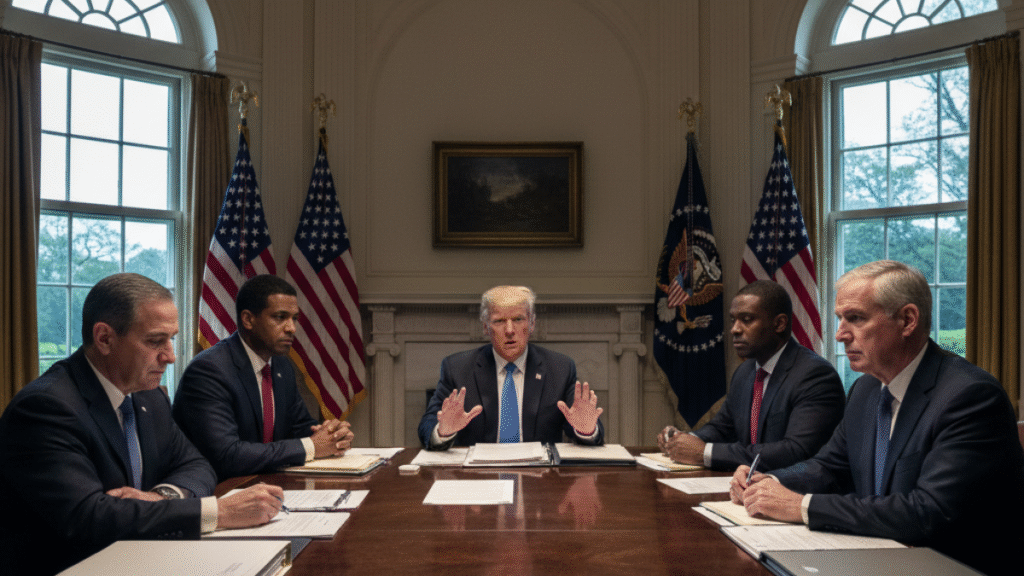A government shutdown looms as Washington faces one of the most critical political showdowns in years. Washington, Sept. 29, 2025 — The clock is ticking, with the U.S. government just hours away from a potential shutdown. At the center of the battle is a fierce fight over health care funding, pitting President Donald Trump and congressional Republicans against Democrats led by Chuck Schumer and Hakeem Jeffries.
If lawmakers cannot agree on a spending plan by midnight on Tuesday, the federal government will run out of money. That means millions of federal workers could be furloughed, military personnel may go unpaid, and critical services could grind to a halt.
This showdown is shaping up to be one of the most dramatic political standoffs of Trump’s second term — and it all comes down to a clash over the future of Obamacare subsidies.
What’s at Stake?
Every year, Congress must pass legislation to fund the government. If they fail to do so, agencies run out of money and are forced to shut down until a new deal is reached.
This time, Democrats are demanding that the stopgap funding bill include billions of dollars to extend subsidies under the Affordable Care Act (ACA), widely known as Obamacare. These subsidies help millions of Americans pay their health insurance premiums. Without an extension, costs could rise sharply when open enrollment begins on November 1.
“We need to cancel the cuts, lower the costs, and save healthcare,” said House Minority Leader Hakeem Jeffries.
Republicans, however, argue that these subsidies don’t expire until later this year and should be debated separately from government funding. They accuse Democrats of holding the government hostage to push their healthcare agenda.
Senate Majority Leader John Thune put it bluntly: “What the Democrats have done here is take the federal government as a hostage — and, by extension, the American people — to get a laundry list of demands.”
The White House Meeting
On Monday, President Trump is set to meet with the top four congressional leaders:
- Chuck Schumer (D-N.Y.), Senate Democratic Leader
- Hakeem Jeffries (D-N.Y.), House Minority Leader
- John Thune (R-S.D.), Senate Majority Leader
- Mike Johnson (R-La.), House Speaker
The meeting is being described as a last-chance effort to avoid a shutdown. But optimism is low. Democrats want guarantees on healthcare, while Republicans want a “clean” bill with no strings attached.
Schumer, speaking on NBC’s Meet the Press, said the session is “a first step, but only a first step. We need a serious negotiation.”
Johnson, speaking for Republicans, countered that Democrats are demanding too much. “The president wants to talk with Chuck Schumer and Hakeem Jeffries and just try to convince them to follow common sense,” he said.
Trump’s Hardline Stance
President Trump has made clear that he’s not interested in compromise. In recent interviews, he said Democrats are pushing for policies that go far beyond subsidies, accusing them of wanting to provide healthcare for undocumented immigrants — a claim Democrats strongly deny.
“It’s up to them,” Trump said. “They want to give billions, ultimately trillions, of dollars to illegal migrants.”
He also suggested that a shutdown could be used as an opportunity to permanently reduce the size of the federal workforce. “If there is [a shutdown], we are going to cut a lot of the people that we’re able to cut on a permanent basis,” Trump told reporters.
That threat has alarmed unions and federal workers, many of whom remember the pain of previous shutdowns when paychecks were delayed for weeks.
The Democrats’ Position
Democrats insist they are not asking for anything radical — only to restore cuts Republicans made earlier this year and to extend subsidies that millions of families rely on.
“Without action, what people pay for healthcare now could double,” Schumer warned.
For Democrats, the fight is also about principles. After yielding to a GOP-written funding bill six months ago, many within the party base are pressuring leaders not to cave again. With just 47 seats in the Senate, Democrats don’t have the numbers to control the outcome — but because 60 votes are needed to pass funding, they hold crucial leverage.
That leverage is why both Schumer and Jeffries are digging in, refusing to give Trump a “clean” win.
What Happens in a Shutdown?
If the government shuts down:
- Federal workers: Hundreds of thousands would be furloughed without pay. Millions more, including military personnel, would have to keep working but wouldn’t receive paychecks until the shutdown ends.
- Services: National parks could close, passport applications could be delayed, and many federal agencies would scale back operations.
- Economy: A prolonged shutdown would strain an already fragile economy. Inflation remains high, tariffs are hurting farmers and small businesses, and recent graduates are struggling in a weak job market. A shutdown would only add more uncertainty.
During past shutdowns, some services like air traffic control and Social Security payments continued, but disruptions were widespread and politically damaging.
Political Blame Game
Both sides are already preparing for the political fallout.
Republicans believe their message is simpler: they want to keep the government open, while Democrats are blocking it over partisan demands. “That is the simplicity of their messaging,” said GOP strategist Doug Heye.
Democrats counter that Republicans are ignoring the needs of ordinary Americans struggling with healthcare costs. They argue that Trump’s threats of mass firings show he is more interested in consolidating power than governing responsibly.
“This will be a long, high-stakes shutdown unlike anything we’ve ever seen before,” warned a senior Democratic aide.
A Risky Game of Chicken
With less than 24 hours to go, neither party appears ready to back down. Senators are returning to Washington for a possible last-minute vote, but the House is out of session until next week. If a deal is reached, Speaker Johnson would have to call members back on short notice.
For now, the U.S. is heading straight toward a shutdown — one that could have serious consequences for federal workers, the economy, and the political landscape heading into next year’s elections.
The coming days will test whether leaders in Washington can put aside partisan battles long enough to keep the government open. Until then, Americans are left bracing for what could be one of the most disruptive shutdowns in U.S. history.
Frequently Asked Questions (FAQ)
Q1. What is a government shutdown?
A government shutdown happens when Congress and the President cannot agree on a funding bill. Without new funding, federal agencies run out of money and are forced to stop or reduce many of their operations.
Q2. When will the government shut down?
If no deal is reached, the shutdown will begin at 12:01 a.m. on Wednesday, October 1, 2025.
Q3. Why are Democrats and Republicans fighting?
The main dispute is over Affordable Care Act (Obamacare) subsidies. Democrats want billions of dollars to extend subsidies and reverse Medicaid cuts, while Republicans want a “clean” funding bill without policy changes.
Q4. Who will be affected by a shutdown?
- Federal workers: Hundreds of thousands would be furloughed, and millions more (including military personnel) would work without pay until the shutdown ends.
- Public services: National parks, passport processing, and other services may be delayed or suspended.
- The economy: A prolonged shutdown could slow growth, hurt small businesses, and add pressure to already high inflation.
Q5. Will military members be paid during a shutdown?
No. Military personnel would still have to work, but their paychecks would be delayed until the shutdown is over.
Q6. Has this happened before?
Yes. The U.S. has seen several government shutdowns in the past, including a 16-day shutdown in 2013 and a 35-day shutdown in 2018–2019 — the longest in history.
Q7. How long could this shutdown last?
That depends on negotiations. Some shutdowns last only a few days, but others have stretched for weeks. Both sides are signaling that this one could be long and highly disruptive.
Q8. Who will Americans blame if the government shuts down?
Both parties are already pointing fingers. Republicans argue Democrats are demanding too much, while Democrats say Trump and the GOP refuse to compromise. In past shutdowns, public opinion has often shifted during the crisis.
……
Read More News Articles

